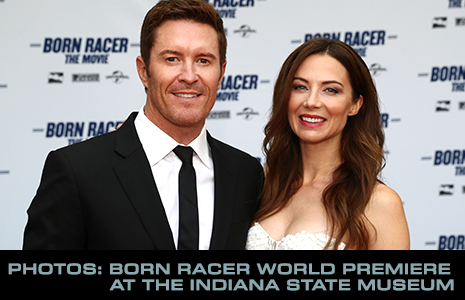“Scott was always so determined that (driving race cars) is what he wanted to do. We had been in the media a lot, so people knew we had really struggled to get Scott to where he got. People would always say, ‘Your son owes you.’ He does not owe me anything.” -- Glenys Dixon, Scott Dixon’s mother
Rarely is the complicated, intertwined nature of motorsports presented plainly. Racing is a tangle of people and issues and motivations. It involves the technical side, the money side, the on-track side and the family side. It’s a complicated sport by nature, and sorting out that complication in an understandable way is difficult at best.
That’s what “Born Racer,” the documentary about Scott Dixon’s 2017 season, does seamlessly. It weaves the pieces together in a way that illuminates the complexities without getting lost in them. It explains what racers do and why they do it without getting overwhelmed by it. Or, worse yet, by oversimplifying it.
The film, directed by Bryn Evans and produced by Matthew Metcalfe, is available today on DVD and digital platforms (visit bornracermovie.com for details). It shifts seamlessly from the macro view to the micro, telling the story of Dixon’s crash during the Indianapolis 500, his return to racing days later in Detroit, and a championship effort that fell just short three months later.
 In that storytelling, though, lie the intricacies and motivations of racing, the question of why people do this. It’s where Dixon’s parents, Ron and Glenys Dixon, become a cornerstone of the film and the attempt to answer the question. They saw their son’s gift at an early age and helped him pursue his goals. Trouble is, they didn’t couldn’t always find the money to keep the dream alive.
In that storytelling, though, lie the intricacies and motivations of racing, the question of why people do this. It’s where Dixon’s parents, Ron and Glenys Dixon, become a cornerstone of the film and the attempt to answer the question. They saw their son’s gift at an early age and helped him pursue his goals. Trouble is, they didn’t couldn’t always find the money to keep the dream alive.
“We tried to be as honest as we could with Scott,” his dad, Ron, says of the early days in New Zealand. “But we would keep him away from the slammed doors, the ‘No, we’re not interested, go away’ or ‘No, motorsport isn’t our thing.’ We borrowed money. I borrowed money. I borrowed money that even Glen didn’t know about. It’s like having a drug addiction. You can’t stop.”
“Born Racer” takes the audience inside the family life and team meetings and long days with the crew. It shows racing’s human side, warts and all, while telling the story of the best driver of his era. It also shows his ability and willingness to be part of something larger than himself, as team owner Chip Ganassi explains.
“So many times sports have these confluences of people, of timing and of equipment, and of the sport itself,” Ganassi said. “You gave this sort of coming together at the right time, and Scott is somebody who wins with the team and loses with the team. I find that very refreshing in today’s world.”
Evans and Metcalfe cover as much in 91 minutes as possible, yet the film never appears scattered. It’s wonderfully filmed and edited, offering a crisp and at times moving inside look at racing and racers. It attempts to explain why people engage in a dangerous activity -- a question that will never be fully answered -- without being maudlin.
We’ve all seen bad racing movies. (Hello there, “Driven.”) The cartoonish depictions of racing on film far outnumber the authentic ones. “Born Racer” has authenticity mastered. It almost makes up for “Days of Thunder.” Almost.
It isn’t so far into the woods that it’s unrelatable to casual fans, but it also tells the story without dumbing down the topic to the point that it would irritate hardcore fans. Telling a story about a complicated subject that a small portion of the public follows deeply without alienating the people who don’t follow it deeply is brilliant. It’s also quite difficult, but Evans and Metcalfe nailed it.
Glenys Dixon is right. Scott doesn’t owe her anything. But those of us who watch him do.